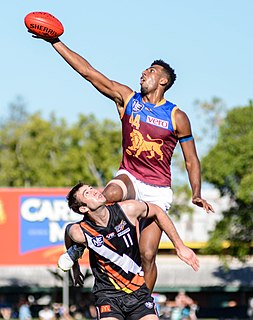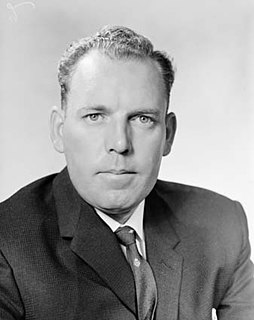This article needs additional citations for verification .(September 2011) (Learn how and when to remove this template message) |
The Douglas Wilkie Medal is an award presented to those who do the least for Australian rules football, in the best and fairest manner. An accolade presented by the Anti-Football League, it is named after Douglas Wilkie, a Sun News-Pictorial columnist who wrote for the paper during the years 1946–1986. It was Douglas Wilkie who first suggested the notion of an Anti-Football League, which was brought into being by Keith Dunstan. The League exists as a response to the overwhelming obsession of football by the Melbourne public.

Australian rules football, officially known as Australian football, or simply called Aussie rules, football or footy, is a contact sport played between two teams of eighteen players on an oval-shaped field, often a modified cricket ground. Points are scored by kicking the oval-shaped ball between goal posts or between behind posts.

The Anti-Football League is an Australian organisation that pokes fun at the obsession with Australian rules football. It was founded by Melbourne journalist Keith Dunstan in 1967.
Douglas Wilkie was a respected columnist for The Sun News-Pictorial (Australia). The son of travelling Shakespearean actors Allan Wilkie and Frediswyde Hunter-Watts, he began his newspaper career as a copy boy with the Hobart Mercury. This period was followed by Sir Keith Murdoch appointing him as Geelong correspondent for The Herald. Wilkie is best remembered for his political commentary for The Sun News-Pictorial for which he wrote during 1946–1986.
The award is the League's answer to the Australian Football League's Brownlow Medal, an honour bestowed on footballers who throughout the season play in a skilled and sportsmanlike fashion.

The Australian Football League (AFL) is the pre-eminent professional competition of Australian rules football. Through the AFL Commission, the AFL also serves as the sport's governing body, and is responsible for controlling the laws of the game. The league was founded as the Victorian Football League (VFL) as a breakaway from the previous Victorian Football Association (VFA), with its inaugural season commencing in 1897. Originally comprising only teams based in the Australian state of Victoria, the competition's name was changed to the Australian Football League for the 1990 season, after expanding to other states throughout the 1980s.

The Charles Brownlow Trophy, better known as the Brownlow Medal, is awarded to the "best and fairest" player in the Australian Football League (AFL) during the home-and-away season, as determined by votes cast by the officiating field umpires after each game. It is the most prestigious award for individual players in the AFL. It is also widely acknowledged as the highest individual honour in the sport of Australian rules football.
Following the suggestion of Wilkie's fellow writer Cyril Pearl, who wished to burn a football to express his disaffection for the game, the winner must destroy a football in a unique and creative manner on receiving their medal. [1]
Cyril Alston Pearl was an Australian journalist, editor, author, social historian, wit and television personality.







